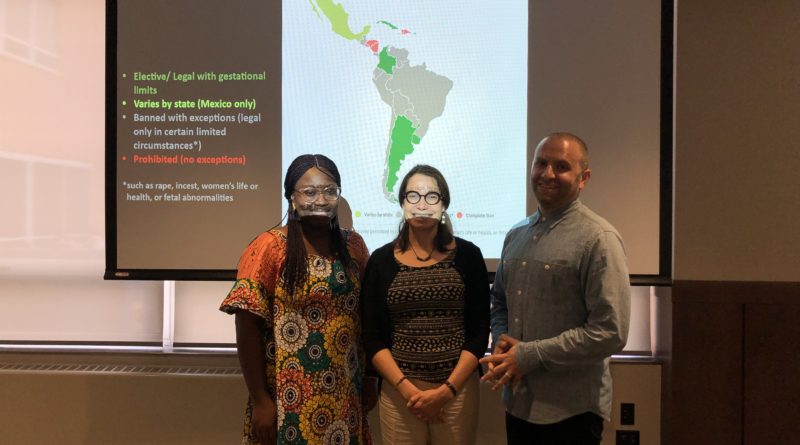UD hosts teach-in on the Dobbs v. Jackson Decision
Three of the teach-in presenters. (Left to right) Satang Nabaneh, Tracey Jaffe and Joel Pruce. Photo by Miller.
Terrance White | Contributing Writer & Circulation/Podcast Manager
Tori Miller | News Editor
Students, faculty and staff came together Monday to discuss the Supreme Court of the United States’ summer decision to overturn Roe v. Wade and restrict abortion rights.
The university hosts teach-ins periodically throughout the semester to gauge student and faculty perspectives on important issues affecting the UD community, Dayton and the nation. six sessions focusing on Dobbs v. Jackson approached different topics and contexts including history and social context, philosophical and multi-faith perspectives, law, global perspectives, systemic injustices, and social movements and politics.
The seminar was put on by the Human Rights Center and each educational session introduced a multitude of perspectives on the politically complex decision.
“We can all agree that there are controversies and the implications on the Dobbs decision,” said Satang Nabaneh, Human Rights Center director of programs and research professor of law. “As a university, I think it [hosting seminars] embodies the idea of academic freedom. Such events are vital for not only providing the context of the various developments that are happening in relation to this specific issue but also providing that safe space to discuss whatever side you might be.”
To provide the historical and social context of the decision, Jamie Small, professor of sociology, spoke on what is going on in the world of abortion laws now and why abortion has been on a steady decline for the past 30 years. She also went through the current status of access to home abortions and modern improvements in reproductive healthcare.
Small said there’s research pointing to people not talking enough about abortions. This is attributed to shame and a stigma around abortion that remains significant in today’s society. The threat of criminalization remains an increasing issue, according to Small.
Anthropology Professor Miranda Cady Hallet proposed more of a historical and anthropological view on abortion.
She discussed how pregnancy and childbirth represented art and ritual objects in ancient societies. She also explained the significance of early herbs and how they caused bodily effects to help abortives.
Hallet would go on to explain how the early 19th century governments had no previous attempts to regulate abortion. She explained how it was not uncommon for abortions and pregnancies to be self-managed. Later in the 19th century, the government increased control of pregnancy and childbirth laws making it also illegal to share information about pregnancies and childbirth plans.
In more of a historical context, as the turn of the century began there was increased sterilization which is when American activist Margaret Sanger led a mass movement to protest the ways of birth control.
Associate director of UD’s international studies program and history professor Tracey Jaffe provided a global perspective of abortion specfically focusing on Latin American Countries.
She said that Latin American culture leaves few options for abortions and that it’s acceptable only under circumstances such as rape, incest, threat to the woman’s life or fetal abnormalities. These restrictions make it very difficult for women to receive an abortion leading to an increase in unsafe abortions– abortions not performed by medical professionals.
Compared to the United States, Jaffe said that Latin American countries are moving in the opposite direction by trying to make abortions more accessible. Over the last few years the Green Wave contemporary movement for reproductive rights has mobilized the actions for safe abortions.
During the teach-in, the speakers also explained the Roe v Wade Supereme Court case of 1973 that made it so state governments and federal governments couldn’t regulate choices regarding abortion. From this decision, Social Movements for reproductive justice emerged. To this day the idea of equity and debate around what people need to live full and healthy lifestyles continue despite the current situations of today’s society.
For more campus news, like Flyer News on Facebook and follow us on Twitter (@FlyerNews) and Instagram (@flyernews).

